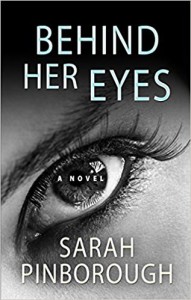 Sarah Pinborough, Behind Her Eyes (Flatiron Books, 2017).
Sarah Pinborough, Behind Her Eyes (Flatiron Books, 2017).
Behind Her Eyes is an extremely well written thriller with character depth and psychological insight. It incorporates a well-crafted narrative with ostensible paranormal phenomena and edge-of-your-seat twists that will leave your head spinning. You might find yourself slamming the book closed at the end and screaming—what the fuck just happened to me?
The novel is as captivating as it is emotionally disturbing. A love-triangle thriller taken to an entirely new level of intrigue and creepiness. You might even say diabolical madness too.
Sarah Pinborough has written a brilliant novel.
Synopsis (Without Spoilers)
Louise is a divorced single mother starting a new part-time job as a secretary in a medical facility. David is a doctor at the clinic and also Louise’s boss. Adele is David’s stay-at-home wife living in a marriage strained from the emotional baggage of distant and not-so-distant past.
It all begins with a kiss, an indiscretion.
Out for drinks one night on the eve of starting her new job, Louise kisses a man she’s fallen for at a pub. On her first day at work, she discovers the man she kissed is her boss and he’s married. After confronting the awkwardness of their situation—David is as surprised as Louise—the two resolve to move forward in their professional roles and pretend the indiscretion never happened. Fail. That’s not going to happen.
Louise has an apparent happenstance encounter with Adele and the two become friends. At Adele’s request, they agree not to tell David about their friendship. Now there are two secrets. Then another: unable to control their desires, Louise and David end up sleeping together; not once, but repeatedly.
So Louise finds herself in the doubly awkward and morally challenging situation of sleeping with her best friend’s husband and Louise hasn’t told David about her friendship with his wife. She’s wracked with guilt and confusion. Should she tell Adela about her affair with David? How to end that? Should she tell David about her relationship with Adele? Her psychological struggle deepens when she begins to suspect that David is an alcoholic who is after Adele’s money and controlling her with manipulative tactics, including keeping her doped up on various prescription drugs.
We discover early on that Adele somehow knows about her husband’s on-going affair with Louise, yet she says nothing to either of them. Why? Because, as she confesses (to the reader), everything is going as she (Adele) has planned. That’s right. Adele has hatched some sort of bizarre scheme, and the affair between Louise and David is part of the plan. She pursues her friendship with Louise with passion and commitment, deepening their emotional bond, going out of her way to help Louise lose weight and conquer a sleep disorder.
Adele learned a technique for curing sleep disorders when she was in a mental institute as a teenager, recovering from a nervous breakdown after the death of her parents in a house fire. Together with a friend named Rob (another patient in the institute), Adele experimented with lucid dreaming and out-of-body experiences. This turns out to be a crucial component of her plan and the linchpin of the wider narrative.
What is Adele scheming? Why?
No spoilers here. I’ll only say this. There are several crucial lines in the story that point the reader in the general direction. David says of Adele at one point—one of my favorite lines of the book—“In her own twisted, fucked-up way, she loves me. She always has and she always will” (p. 277).
What’s Great about this Novel?
Behind Her Eyes is an impressive demonstration of story telling, probably the best psychological thriller I’ve read.
The personality and psychodynamics of the three main characters are well developed, and their intentions and behaviors are plausibly motivated. There’s much here that’s rooted in real life. The behaviors of the main characters serve genuine needs and interests, as well as fuel psychologically insightful conflicts. Then there are all the ambiguities of real life, especially the more extreme manifestations people appearing to be other than they are. Pinborough nicely crafts alternating first-person points of view that convey an intimate portrait of Louise and Adele. Each has a very strong character voice.
 Pinborough masterfully deploys “misleading evidence,” a crucial aspect of a good psychological thriller. Throughout the novel it appears that characters have motives and intentions that we subsequently discover they do not have. Characters are not who they seem to be. Appearances deceive. And not just from the viewpoint of the characters. For much of the novel the reader is a participant in the experience of interpretive ambiguity and misdirection.
Pinborough masterfully deploys “misleading evidence,” a crucial aspect of a good psychological thriller. Throughout the novel it appears that characters have motives and intentions that we subsequently discover they do not have. Characters are not who they seem to be. Appearances deceive. And not just from the viewpoint of the characters. For much of the novel the reader is a participant in the experience of interpretive ambiguity and misdirection.
One of my favorite quotes from the book sums this up: “It’s strange how different we all appear to who we really are” (Louise, p. 139). Radical opacity. An inner world standing in complete contradiction to our outer face. The source of much suffering.
For much of the story there’s an intentional ambiguity as to whether ostensible out-of-body experiences are genuine paranormal experiences or merely hallucinatory in nature. However, Pinborough doesn’t leave this aspect of the story open-ended. It’s nicely resolved in the latter part of the story, initially suggested and then directly disclosed.
The book nicely handles backstory, seamlessly weaving it into the wider narrative. Alternating first-person points of view tell the front story. A recurring third-person point of view supplies the important backstory: Adele’s time in a psychiatric institute in her teens, shortly after the death of her parents in a house fire, and the evolution of her friendship with another resident in the institute, a guy named Rob. The digressions into backstory are diachronic in nature. The reader sees the backstory in brief clips moving forward in time, building up to a pivotal past event that’s the key to the novel’s front story.
Yes, the ending was a stunner. Neither the first nor the second twist is implausible given the wider narrative. It’s a believable ending, but it’s nonetheless surprising. The clues were there all along but well concealed. That’s part of the beauty of this book. The pieces of the puzzle only come together at the end.
When I finished the book, I slammed it shut, threw it down, and blurted out “this fucked me up.” It did. It blew my mind. I was disturbed, and yet I smiled. A pleasurable mind fuck. That’s what it was. And what a wonderful thing that is.
Michael Sudduth

 Follow
Follow